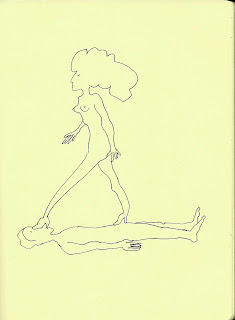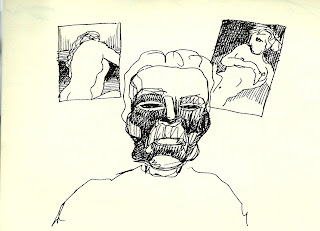
While I have some baggage I carry around about my father (who
doesn’t?) I have to admit to myself that there were times, as a child, that my daddy was my hero. I thought my daddy was the smartest, most talented man that had ever lived. When my father said something I treasured the words, I secreted them away in that part of my brain I called MY HEART. I like to pretend I have forgiven my father and that my grudges have gone the way of icicles in spring, but the grudges are still there cold and sharp and hanging over me menacingly. Nevertheless, despite my grudges remaining, I know there there are still things about my father’s life that I admire. I have regrets for my father. I know that he sacrificed the life he wanted and surrendered his shot at greatness to support his family. I know he was trapped and I know why.
My father had a significant measure of artistic ability. Had he made a few different choices as a young man, there is a good chance that he would be as well known today as Norman Rockwell.
My father seemed unable to talk with me, unless he was driving. If I sat next to him, and he drove somewhere he would talk as he drove. The vast majority of my non-terrifying memories of my father occurred while he was driving and I was riding shot gun.
My father told me a lot of stories about artists. He would talk about how great Paul Cezanne,
Telus Lautrec,
René Degas, Vincent Van
Gogh, Paul
Gogan were and he knew a lot of biographical details. Later I learned that he had some of the facts wrong, but those factual errors did not diminish the intoxication of the tales. I was fascinated by the lives of these artists. To my father these were rags to riches stories. My dad
didn’t want to work, he wanted to be rich and famous doing stuff he enjoyed doing. Who
doesn’t want the same? My dad wanted to do what he wanted to do and be rich and famous doing it.. To him it looked like a short cut to the easy life. An artists take cheap canvas and paint and turn it into masterpieces admired for hundreds of years, and sometimes it is the source of enormous wealth.
Eventually I learned that my father
didn’t really want to paint he wanted to be a rich famous painter. Being an artist was not the goal, being a famous artist was the goal. That was what he wanted for me, to be a rich famous artist who’s name and work would be admired for a thousand years or longer. Education was not valued by my family. The main value in my family was creativity. Creativity was not just valued, it was the highest of all values.
Some of my father’s paintings really wowed me. I have, in a place of honor on the walls of my home, a picture my father painted in 1954,. While I saw that painting almost every day that I lived in his home, I still find it a very fine painting. His technical skill was very, very good.
As I grew older, however, I noticed something about my dad’s artistic work ethic. He was a very fine artist, but he just
didn’t produce much art. When a picture was finished, when the quality of the work was to the point he wanted it to be, then it was done and had to be protected and treasured. He never immediately started another picture. My father was also very reluctant to sell his work, or to give it away to family.
I sometimes got the feeling that once he had completed a picture he was afraid he would not be able to do another picture as good as THAT one, and he was reluctant to start another and prove himself right.
The other thing I noticed about my dad is that most of his paintings were copies. I remember him trying portraits of his wife and children, but he just did not do that much original work. I remember him painting pictures from photos he saw in photography magazines. What I remember him doing most was copying paintings by artists he referred to as “the great masters.” The thing about copying an existing work of art, or even a carefully composed photo, is that all the work of composing the picture is already done. Someone else has worked out the color pallet, the perspective, the copied picture has already found the light source and located the places where shadow needs to be to give it the desired look.
I caught that same disease. I would paint a picture and then be too afraid to start another. I too used magazines as a source for my painting subject matter. I wanted to keep every picture I painted because I feared no one else would care about them enough to let them go, and it was always possible the “gift” would leave me and I’d have no evidence left to show I had been a successful artist.
Eventually I gave up on my father’s artistic goals and found my own goal. I became a more productive and somewhat happier artist when I faced what I believe are real yet disappointing truths. What I discovered was that I was a better artist when I stopped caring about the finished product. I go into a zen like altered state when I paint, but once it is done, once I've allowed the images to settle in a little, the finished product becomes just a trace of moments I am soon going to forget.
I’m not going to be a famous artist -- so I might as well not try. To be famous, my work has to be perfect. Each picture has to be a
knocking it out of the ball park crowd please-
er. If I can’t do that kind of painting consistently then I can’t be famous. Here is the advantage of accepting my mediocrity:
If I’m not going to be famous then I am free do paint bad pictures. Once in a while I might paint something I think is pretty cool, but mostly, it just really
doesn’t matter what I paint, how well I paint, and it
doesn’t matter if other people like what I paint. To be a rich and famous artist most people have to love your work. I’m not famous, I'm not cut from that kind of cloth, so I’m not under any obligation to produce famous quality work. If I like to paint then I am now able to paint all I want with no restraints, no
parameters, no rules, and no expectations.
If I paint a lot, then selling paintings, and giving paintings away is not a problem. If I paint a lot and don’t distribute my work, then I’ll soon be covered up with paintings. If I’m not a famous artist then who the hell cares what I paint? I can copy if I want to. I can do stuff out of my head and not give a tinker’s damn if the shadows are all in the right place? I paint to please myself. I am free to paint what I want, how I want. I don’t have to be good enough to sell because selling is not the goal. I don’t have to paint good enough to be famous, because fame is a pipe-dream inherited from my father. Because I am free from my father’s obsession with fame and fortune I am free to paint. My wife, who sees all this as a hobby, has said, “When you paint, you do better.” She has endured almost 40 years with a chronically depressed husband. If painting make me easier to live with then that’s just one more reason to keep painting.
I have already painted more pictures than has my father did. I have sold paintings in shows, I’
ve taken commissions, I’
ve painted murals, filled sketch books, and given pictures away. I have pictures in the Netherlands, in Australia,
Abu Dhabi. Every where I have lived I’
ve left pictures behind, Milwaukee, Kansas, Virginia, Florida, and all over Texas. I decided that while I may not be good enough to be the sort of painter my father wanted me to be, I am good enough to be the kind of painter I am. I may not be all that good, but what I lack in ability I make up for with volume. And here is the secret I learned: I enjoy painting. I paint because I like to paint. I only have to paint good enough to have fun painting. Nothing is freer than that.












